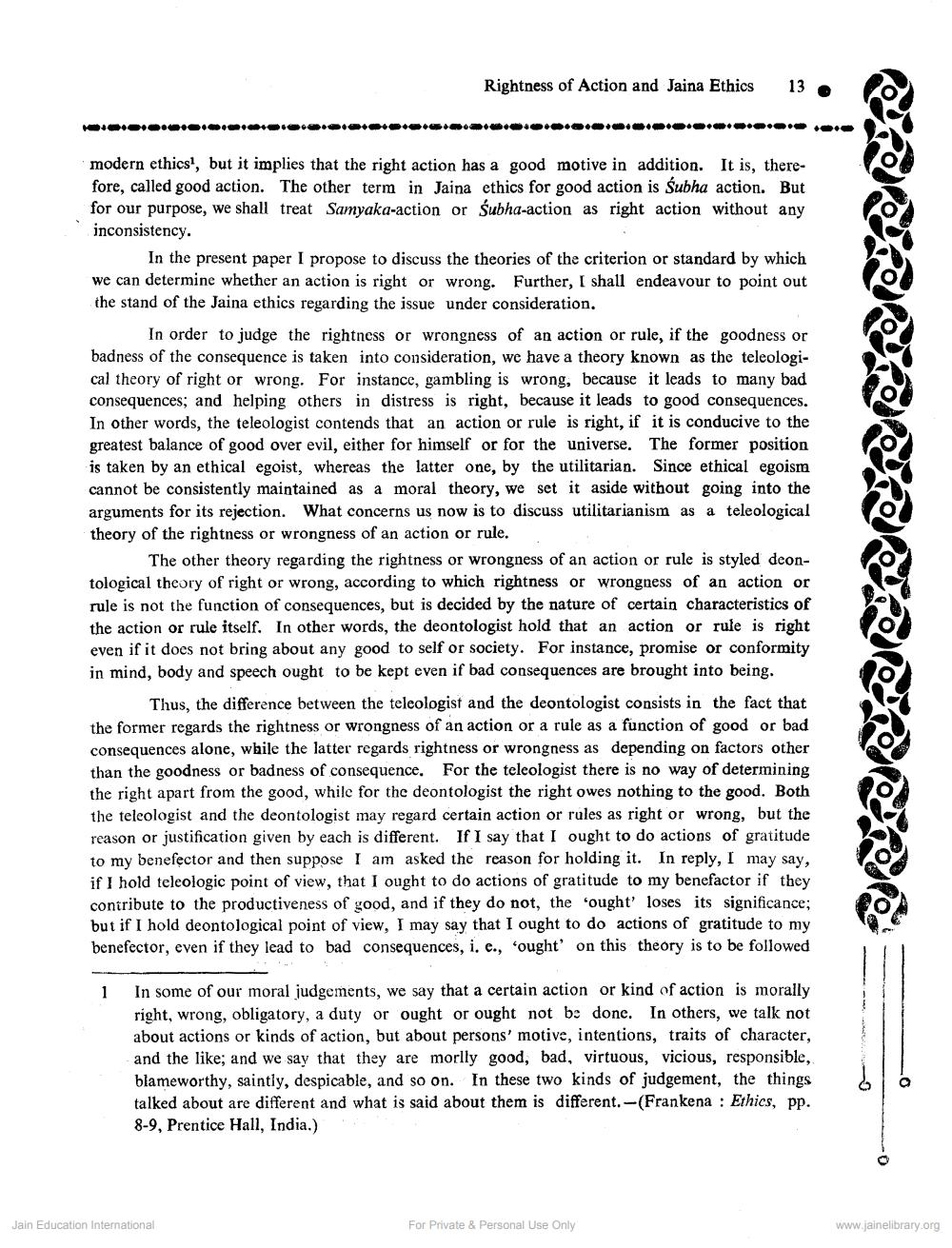________________
+-+
Rightness of Action and Jaina Ethics
modern ethics1, but it implies that the right action has a good motive in addition. It is, therefore, called good action. The other term in Jaina ethics for good action is Subha action. But for our purpose, we shall treat Samyaka-action or Subha-action as right action without any inconsistency.
In the present paper I propose to discuss the theories of the criterion or standard by which we can determine whether an action is right or wrong. Further, I shall endeavour to point out the stand of the Jaina ethics regarding the issue under consideration.
13
In order to judge the rightness or wrongness of an action or rule, if the goodness or badness of the consequence is taken into consideration, we have a theory known as the teleological theory of right or wrong. For instance, gambling is wrong, because it leads to many bad consequences; and helping others in distress is right, because it leads to good consequences. In other words, the teleologist contends that an action or rule is right, if it is conducive to the greatest balance of good over evil, either for himself or for the universe. The former position is taken by an ethical egoist, whereas the latter one, by the utilitarian. Since ethical egoism cannot be consistently maintained as a moral theory, we set it aside without going into the arguments for its rejection. What concerns us now is to discuss utilitarianism as a teleological theory of the rightness or wrongness of an action or rule.
The other theory regarding the rightness or wrongness of an action or rule is styled deontological theory of right or wrong, according to which rightness or wrongness of an action or rule is not the function of consequences, but is decided by the nature of certain characteristics of the action or rule itself. In other words, the deontologist hold that an action or rule is right even if it does not bring about any good to self or society. For instance, promise or conformity in mind, body and speech ought to be kept even if bad consequences are brought into being.
1
Thus, the difference between the teleologist and the deontologist consists in the fact that the former regards the rightness or wrongness of an action or a rule as a function of good or bad consequences alone, while the latter regards rightness or wrongness as depending on factors other than the goodness or badness of consequence. For the teleologist there is no way of determining the right apart from the good, while for the deontologist the right owes nothing to the good. Both the teleologist and the deontologist may regard certain action or rules as right or wrong, but the reason or justification given by each is different. If I say that I ought to do actions of gratitude to my benefector and then suppose I am asked the reason for holding it. In reply, I may say, if I hold teleologic point of view, that I ought to do actions of gratitude to my benefactor if they contribute to the productiveness of good, and if they do not, the 'ought' loses its significance; but if I hold deontological point of view, I may say that I ought to do actions of gratitude to my benefector, even if they lead to bad consequences, i. c., 'ought' on this theory is to be followed
Jain Education International
In some of our moral judgements, we say that a certain action or kind of action is morally right, wrong, obligatory, a duty or ought or ought not be done. In others, we talk not about actions or kinds of action, but about persons' motive, intentions, traits of character, and the like; and we say that they are morlly good, bad, virtuous, vicious, responsible, blameworthy, saintly, despicable, and so on. In these two kinds of judgement, the things talked about are different and what is said about them is different.-(Frankena : Ethics, pp. 8-9, Prentice Hall, India.)
For Private & Personal Use Only
www.jainelibrary.org




